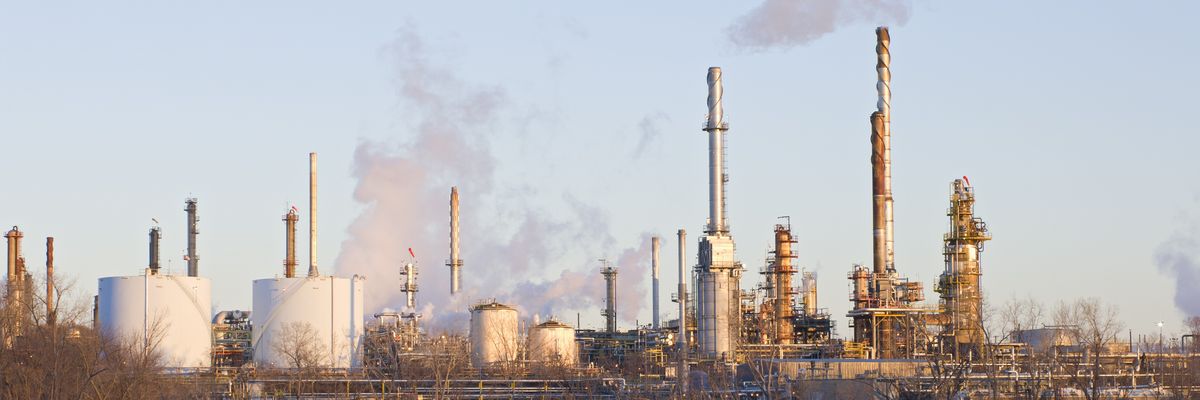Supreme Court Hears Koch-Backed Cases Designed to Unleash Deregulatory Bonanza
Original article by JAKE JOHNSON republished from Common Dreams under Creative Commons (CC BY-NC-ND 3.0).

The conservative-dominated U.S. Supreme Court on Wednesday heard oral arguments in a pair of cases taking direct aim at a critical precedent that, if overturned, would gut federal agencies’ ability to set and enforce regulations—a potentially massive blow to the climate, civil rights, public health, and more.
Central to Loper Bright Enterprises v. Raimondo and Relentless, Inc. v. Department of Commerce is the so-called Chevron doctrine, which stems from a 1984 Supreme Court opinion that said judges should defer to federal agencies’ reasonable interpretation of a law if Congress has not specifically addressed the issue.
The precedent has long been a target of the fossil fuel industry and right-wing groups that are backing the plaintiffs in Loper and Relentless, both of which involve herring fishermen who challenged federal rules requiring them to pay for onboard compliance monitors.
Organizations that have received millions of dollars from the oil-soaked Koch network are supporting the effort to overturn the Chevron doctrine. In Loper, the plaintiffs’ lawyers are “working pro bono and belong to a public-interest law firm, Cause of Action, that discloses no donors and reports having no employees,” The New York Timesreported Tuesday.
“However,” the Times added, “court records show that the lawyers work for Americans for Prosperity, a group funded by [Charles] Koch, the chairman of Koch Industries and a champion of anti-regulatory causes.”
Relentless plaintiffs are represented by the New Civil Liberties Alliance, a right-wing group that has received millions from the Charles G. Koch Charitable Foundation.
Caroline Ciccone, president of the watchdog group Accountable.US, said in a statement Wednesday that “the special interests who spent big to stack the court may get their way if the Supreme Court weakens the government’s ability to hold industry accountable when they pollute for profit.”
“Everything from the climate to consumer safety could be worse off thanks to this potential decision and the corporate lobbyists who brought us to this point,” Ciccone added.
Earlier this week, Accountable.US urged right-wing Justice Neil Gorsuch—who has criticized the Chevron doctrine—to recuse from Loper, citing his ties to a billionaire oil tycoon who is positioned to benefit from a ruling that scraps the decades-old precedent. Justice Clarence Thomas also faced calls to recuse over his ties to the Koch network.
Neither agreed to step away from the case.
At the start of the Supreme Court’s hearing Wednesday, liberal Justice Elena Kagan expressed concern that gutting Chevron would give judges who lack subject-matter expertise power over policy decisions previously made by agencies staffed with scientists and other experts.
“You think that the court should determine whether a new product is a dietary supplement or a drug, without giving deference to the agency where it is not clear from the text of the statute or from using any traditional methods of statutory interpretation whether in fact the new product is a dietary supplement or a drug?” Kagan asked Roman Martinez, an attorney for the plaintiffs in Relentless. “You want the courts to decide that?”
The U.S. Supreme Court, which includes three justices appointed by former President Donald Trump, has recently shown a willingness to curb federal agencies’ power to enforce key laws. In its 2022 ruling in West Virginia v. Environmental Protection Agency, the court’s conservative supermajority limited the EPA’s authority to regulate power plants under the 1970 Clean Air Act.
But environmentalists and others warned that a ruling in favor of the plaintiffs in Loper and Relentless would strike a far more sweeping and devastating blow.
“The consequences of this case will be serious for fishery management, yes,” said Meredith Moore, director of Ocean Conservancy’s fish conservation program. “But it also puts at risk all of the environmental and social programs that keep our air and water clean, our homes and workplaces safe, and ourselves and our children healthy.”
“If the Supreme Court eradicates Chevron deference, it will overturn 40 years of foundational administrative and environmental law that has provided stable public resource management,” Moore added. “It will allow science-based management and agency expertise to be replaced with the inexpert policy and ideological preferences of unelected judges, potentially resulting in dramatically different interpretations of law across the country.”
Tishan Weerasooriya, senior associate of policy and political affairs at Stand Up America, echoed those concerns, saying in a statement that “if the MAGA justices of the court overturn another decades-old precedent, it will greatly reduce the ability of scientists and experts at government agencies to defend every Americans’ right to clean water and air, worker protections, healthcare, and more.”
“Billionaires and elite corporations have been gunning to overturn this precedent for years, hoping to increase their profits even further if experts and scientists are no longer setting safety standards,” said Weerasooriya. “If the Roberts court overturns Chevron, it will continue to erode our fundamental freedoms and safety in deference to the wealthy and corporations.”
Original article by JAKE JOHNSON republished from Common Dreams under Creative Commons (CC BY-NC-ND 3.0).
